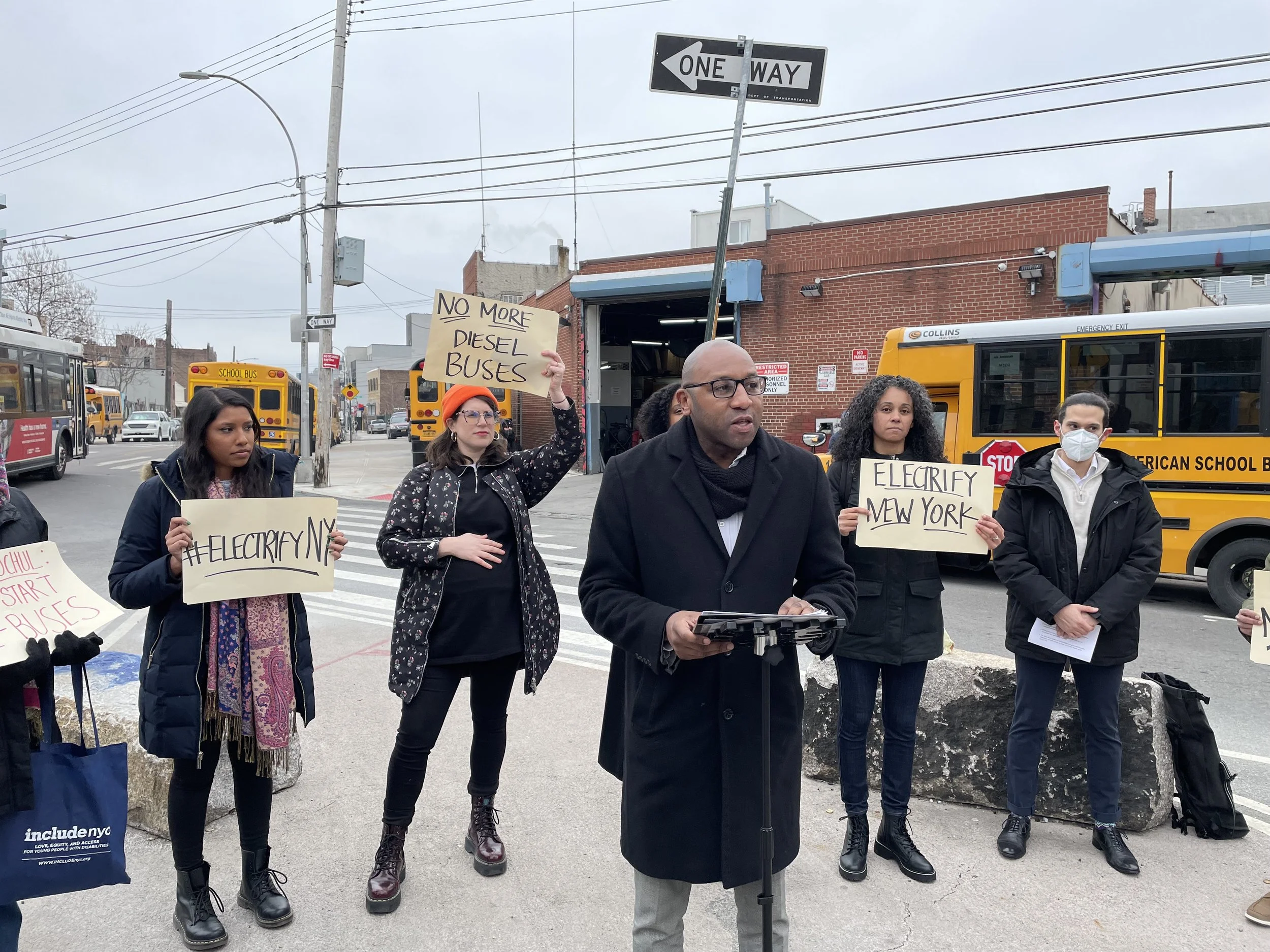Advocates call on Hochul to speed up electric school bus timeline
/Queens Borough President Donovan Richards joined advocates from ElectrifyNY in Astoria on Tuesday, March 1, to call on the state to accelerate its timeline for implementing an all-electric school bus fleet. Eagle photo by Jacob Kaye
By Jacob Kaye
In October of last year, New York City passed a law requiring the five boroughs’ school bus fleet to go all-electric by the fall of 2035. A few months later, Governor Kathy Hochul committed every one of the state’s school districts to the same promise, with the same deadline, during her State of the State address.
But activists and Queens officials gathering in Astoria Tuesday say the promise, and its 13-year deadline, don’t go far enough to combat the pollutants spewed by the state’s 50,000 school buses.
Standing outside of the All American School Bus Corporation Depot, blocks away from NYCHA’s Astoria Houses and in the heart of what has been dubbed “Asthma Alley,” members of the ElectrifyNY coalition and Queens Borough President Donovan Richards called on Hochul to accelerate New York’s timeline for procuring an all-electric fleet and asked that she specify how school districts will pay for the new wheels.
Rally-goers also called on the governor to prioritize neighborhoods, like Northwest Astoria, affected most by environmental issues.
“Our state’s almost 50,000 buses run nearly 365 days a year, and while they run, they are contaminating the lungs of our kids and of our families,” Richards said. “Electric buses are an innovative and, ultimately, life saving technology school communities and, in turn, the rest of our city needs.”
“But we shouldn't have to wait so long to get the ball rolling,” he added.
Members of the ElectrifyNY coalition – which is made up of a dozen mostly environmental groups – applauded Hochul for making the electric school bus commitment, but said she didn’t go far enough in laying out an actual pathway forward.
"Governor Kathy Hochul has put forward one of the most ambitious climate change plans the nation has seen in this year's State of the State,” a spokesperson in the governor’s office told the Eagle. “The Governor's plan includes transitioning 100% of New York State's roughly 50,000 school buses to electric by proposing legislation that all new school bus purchases after 2027 be zero-emission, which in turn will make all buses on the road electric by 2035, the Governor will work closely with all stakeholders and partners to achieve that goal."
In the report that accompanied Hochul’s State of the State speech, the governor said she would “propose legislation to require that, by 2027, all new school bus purchases will be zero-emissions, and that by 2035, all school buses on the road will be zero-emissions.”
The governor said that the legislation would also provide funds to school districts to help purchase the buses and to install electric bus infrastructure, including charging stations.
A bulk of the funds is expected to come from the federal government – the federal Infrastructure Investment and Jobs Act, which passed in January, sets aside $5 billion over five years for a competitive program for electric bus production. Hochul also committed the State Education Department, the New York State Energy Research and Development Authority and the New York Power Authority to working with schools to apply for the funding.
Last year, the All American School Bus Corporation – the site of Tuesday’s rally – was awarded a $200,000 rebate from the federal government to replace 10 buses in its fleet for electric models.
But Hochul didn’t mention targeting communities that have been adversely affected by emissions from buses – the majority of buses run on diesel fuel. As advocates rallied in Astoria on Tuesday, a number of idling buses shot off fumes before heading out on their route.
“Now is the time to make real investments in our communities that have for too long felt left behind,” said Jenny Veloz, an organizer with New York Lawyers for the Public Interest. “That starts with the financial resources that will ensure equity throughout the process – purchasing the infrastructure and job training. Clean air should be a right, not an option.”
Last year, former Mayor Bill de Blasio committed to bringing 75 electric school buses to the city by 2023, ahead of the city’s 2035 goal for an all-electric fleet.
The New York City Department of Education did not respond to request for comment before print time.
Update: This story was updated to include a statement from the governor’s office at 10:19 a.m., on Wednesday, March 2, 2022.




